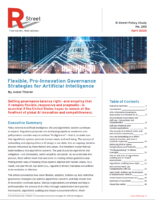Recently, the Future of Life Institute released an open letter that included some computer science luminaries and others calling for a 6-month “pause” on the deployment and research of “giant” artificial intelligence (AI) technologies. Eliezer Yudkowsky, a prominent AI ethicist, then made news by arguing that the “pause” letter did not go far enough and he proposed that governments consider “airstrikes” against data processing centers, or even be open to the use of nuclear weapons. This is, of course, quite insane. Yet, this is the state of the things today as a AI technopanic seems to growing faster than any of the technopanic that I’ve covered in my 31 years in the field of tech policy—and I have covered a lot of them.
In a new joint essay co-authored with Brent Orrell of the American Enterprise Institute and Chris Messerole of Brookings, we argue that “the ‘pause’ we are most in need of is one on dystopian AI thinking.” The three of us recently served on a blue-ribbon Commission on Artificial Intelligence Competitiveness, Inclusion, and Innovation, an independent effort assembled by the U.S. Chamber of Commerce. In our essay, we note how:
Many of these breakthroughs and applications will already take years to work their way through the traditional lifecycle of development, deployment, and adoption and can likely be managed through legal and regulatory systems that are already in place. Civil rights laws, consumer protection regulations, agency recall authority for defective products, and targeted sectoral regulations already govern algorithmic systems, creating enforcement avenues through our courts and by common law standards allowing for development of new regulatory tools that can be developed as actual, rather than anticipated, problems arise.
“Instead of freezing AI we should leverage the legal, regulatory, and informal tools at hand to manage existing and emerging risks while fashioning new tools to respond to new vulnerabilities,” we conclude. Also on the pause idea, it’s worth checking out this excellent essay from Bloomberg Opinion editors on why “An AI ‘Pause’ Would Be a Disaster for Innovation.”
The problem is not with the “pause” per se. Even if the signatories could somehow enforce a worldwide stop-work order, six months probably wouldn’t do much to halt advances in AI. If a brief and partial moratorium draws attention to the need to think seriously about AI safety, it’s hard to see much harm. Unfortunately, a pause seems likely to evolve into a more generalized opposition to progress.
The editors continue on to rightly note:
This is a formula for outright stagnation. No one can ever be fully confident that a given technology or application will only have positive effects. The history of innovation is one of trial and error, risk and reward. One reason why the US leads the world in digital technology — why it’s home to virtually all the biggest tech platforms — is that it did not preemptively constrain the industry with well-meaning but dubious regulation. It’s no accident that all the leading AI efforts are American too.
That is 100% right, and I appreciate the Bloomberg editors linking to my latest study on AI governance when they made this point. In this new R Street Institute study, I explain why “Getting AI Innovation Culture Right,” is essential to make sure we can enjoy the many benefits that algorithmic systems offer, while also staying competitive in the global race for competitive advantage in this space. Continue reading →
 The R Street Institute has just released my latest study on AI governance and how to address “alignment” concerns in a bottom-up fashion. The 40-page report is entitled, “Flexible, Pro-Innovation Governance Strategies for Artificial Intelligence.”
The R Street Institute has just released my latest study on AI governance and how to address “alignment” concerns in a bottom-up fashion. The 40-page report is entitled, “Flexible, Pro-Innovation Governance Strategies for Artificial Intelligence.”
 The Technology Liberation Front is the tech policy blog dedicated to keeping politicians' hands off the 'net and everything else related to technology.
The Technology Liberation Front is the tech policy blog dedicated to keeping politicians' hands off the 'net and everything else related to technology.